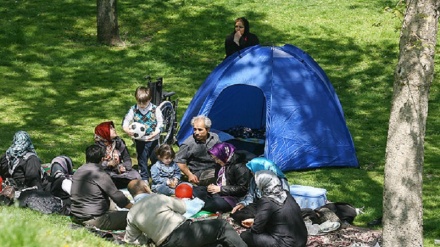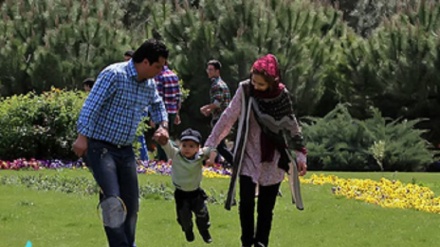Iranian Family (26)
Welcome to this week's episode of the series "Iranian Family". Family is the foundation and basis of a healthy community. The significance and importance of a gift is not tied to its high value. In fact, the importance of a gift is related to the kindness which is conveyed via presentation of that gift.
The Leader of Islamic Revolution, Ayatollah Seyyed Ali Khamenei, focuses on the importance of family, noting: "Every single individual, throughout his lifetime, faces a number of challenges and incidents on a daily basis. These incidents impact his nerves and makes him exhausted. Meanwhile, when the individual establishes a family, this safe environment revives his energy and prepares him for another day. In fact, establishment of a family benefits the individual; boosts his efficiency; grants meaning, importance, value, and quality to his life. Hence, the opportunity of marriage and attainment of peace of mind via establishment of a family is one of the important lifetime opportunities which arises for every individual, enabling him/her to continue his activities, and providing a means to achieve tranquility and to find a sympathizer, which is of paramount importance for mankind throughout his lifetime."
As a reminder, we realized that ethnical diversity of the Iranian community has resulted in different demographic behavioral patterns for Iranian ethnicities, and has resulted in the diversity of marriage role models among different ethnicities.
Azaris constitute a large ethnicity in Iran, and have played an important and vital role within the major historical developments throughout the country. A large segment of the habitats of Azaris in Iran constitute forested and mountainous regions. These regions maintain chilly winters, while having a moderate climate within spring and summer seasons.
Azari families enjoy solid foundations and are comprised of parents and their children. Some of the Azaris have extended families, with grandparents also living under the same roof with their children and their grandchildren. Families in Azarbaijan region of Iran are mainly paternal in structure, with the father or elder son of the family making final decisions and having the final say.
Azaris highly protect their children such that familial support is a source of hope and inspiration for children, alleviating their potential vulnerability. Familial relationships are powerful among Azaris.
In the past, Azari parents sought sons in order to meet their financial needs, and as a source of support for them in their advanced age. Azaris also love to have daughters. In Azari poems women are on an equal footing with men. Azaris honor their mothers. Having a daughter gladdens Azari parents to the same extent of having a son. Azari women have been highly skillful in marksmanship and horse riding. Azari women are courageous, and resilient, and maintain numerous rights and authorities. Azari legends have resembled daughters to red apples.
Marriage is a sacred bond and his highly valued and honored among the people of East Azarbaijan Province. This in turn has led to glorious weddings.
After the selection of an appropriate family, and agreement of the girl's family with marriage; happy gatherings are held. The elderly familial figures gather in the bride's home, exchanging views about the wedding ceremony. After reaching an agreement, a lump sugar is brought by the groom's family and is broken into pieces by one of the familial elderly figures. Any individual which hands over the upper part of the lump sugar to bride's mother will receive a gift from her. After the engagement ceremony, the arrangements are made for purchasing colorful garments, gold, and jewelry for the bride, in addition to gifts which are presented to bride's family.
Throughout the wedding ceremony, single girls who are at the age of marriage, hold a while garment over the heads of the bride and bride's groom, grinding lumps of sugar over the white garment as a sign of happiness and sustainability of the life of the couple, while also singing local songs.
Within the Azari marriages, after the preparation of the bride's groom, a sheep is slaughtered, the meat is cooked and the guests are served. After holding cheerful festivities, the traditional Azari dances are held.
MR/ME


